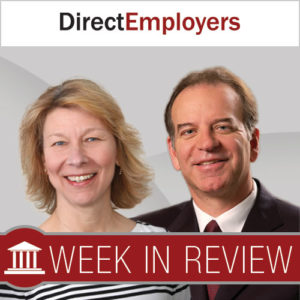
October 30, 2015: OFCCP Withdraws “Infographic” Which Had Caused Some Washington D.C. Based Contractor Vendors To Erroneously Report OFCCP Had Changed Its Definition Of Who Was a “Protected Veteran”: Background: “During a war” vs “During a period of war”. OFCCP recently published a new Infographic (now withdrawn) on its website describing who is a Protected Veteran. Two vendors reported that OFCCP’s Infographic stated that Campaign and Expedition badge holders and service medal recipients included those veterans who served “during a period of war” (defined by 38 USC 101…which is a definition which helps all veterans qualify for employment preferences and certain pension benefits). However, OFCCP’s regulations state that veterans are covered as Campaign Badge/Service Medal recipients ONLY if they served “during a war” or received a Campaign Badge or Service Medal as defined by 38 USC 4212(a)(3) (and NOT by 38 USC 101).
The terms “during a war” and “during a period of war” are military “terms of art” and are quite different. The term “during a period of war” covers many veterans who did not serve “during a war” (our last “war” was WWII) and “during a period of war” covers many veterans since WWII who did not receive a Campaign Badge or Service Medal, including many who fought in Iraq and many now returning from active duty throughout the Middle East.
On Friday October 30, 2015 Candee Chambers introduced OFCCP Director Pat Shiu at the Chicago location of the 33rd Annual National Employment Law Institute (”NELI”) Affirmative Action Briefing. Director Shiu then answered a question from John Fox about OFCCP’s definition of the term “Protected Veteran” and whether OFCCP had intended to change the definition through the referenced OFCCP Infographic. Director Shiu unhesitatingly told the capacity audience in the main ballroom at The Four Seasons Hotel that OFCCP both could not broaden the definition of who was a “Protected Veteran” and that OFCCP’s lawyers did not believe OFCCP had done so in its Infographic.
NOTE: OFCCP specifically rejected a broadened definition of the term “Protected Veteran” in its final VEVRAA (4212) Rule which became legally effective March 24, 2014 saying the agency did not have the license or liberty to do so:
“One commenter suggested that OFCCP expand the types of veterans protected under VEVRAA to include Desert Storm-era veterans, veterans that served in a war zone and veterans who utilize service dogs. The categories of “protected veterans” are not set by OFCCP, but rather are defined by the VEVRAA statute codified at 38 U.S.C. 4212(a)(3). OFCCP cannot expand the categories beyond those set forth in the statute. ”(Emphases added) 78 Federal Register 58621 (middle column, middle) September 24, 2013 (i.e. OFCCP’s Final 38 USC 4212 Rule).
Accordingly, the recent vendor reports of OFCCP having changed its definition of the term “Protected Veteran” should thus be disregarded and ignored as erroneous.
October 30, 2015: OFCCP Director Pat Shiu Says Federal Contractors Must Allow Biological Male Transgender Employees Transitioning To a Woman To Use The Contractor’s All Female Bathroom: Speaking at the National Employment Law Institute’s 33rd Annual Affirmative Action Briefing at its Chicago location, OFCCP Director Pat Shiu told NELI attendees that OFCCP would prosecute covered federal contractors for violating OFCCP’s Executive Order 11246 prohibition on gender-identity if they did not permit biological males transitioning to a woman (and vice versa) to use the contractor’s all female bathroom, citing the EEOC’s recent decision interpreting Title VII’s prohibition on sex discrimination in Lusardi v. McHugh.
Director Shiu also responded to a question whether the OFCCP would require federal contractors to permit biological males transitioning to a woman (and vice versa) to use the contractor’s all female corporate gymnasium shower room. Without mentioning the employee privacy questions which differentially pervade this question relative to the access to bathroom question, Director Shiu said that they had not yet made a policy determination about the shower room access issue.
Director Shiu also invited the NELI attendees to send OFCCP Policy Director Debra Carr questions about transgender discrimination issues for the agency’s review, including when during a transgender’s transition a covered federal contractor or subcontractor must change its corporate records to reflect the new sex of the applicant or employee (i.e. when transition begins; when the transgender Applicant/employee has completed a formal name change (if s/he does so) consistent with state law; when transition is complete?) See related story, below.
DE Transgender Issues Compliance Clearinghouse: If you have questions you would like to have OFCCP answer concerning transgender transitions, please feel free to send them to Candee Chambers, who is collecting questions about transgender transitions on behalf of DE Members. Please be assured that the Member’s identity will remain confidential and anonymous to the OFCCP. Candee will bundle the questions and will present them to Director Shiu and Debra Carr at Director Shiu’s suggestion. Please use Candee’s e-mail address as follows (candee@directemployers.org). Also, to expedite processing of your question(s), please insert this information in your e-mail subject line: Question for the DE Transgender Issues Compliance Clearinghouse.
October 29, 2015: OMB received the draft “final regulations” for Discrimination on the Basis of Sex from the OFCCP for review and approval. The Office of Management and Budget (OMB) must now complete a final review and issue its approval before the Rule becomes legally effective. The OFCCP is on track with their previously published expectation to have this regulation released in its final form during December 2015. Stay tuned as more information will be forthcoming.
THIS COLUMN IS MEANT TO ASSIST IN A GENERAL UNDERSTANDING OF THE CURRENT LAW AND PRACTICE RELATING TO OFCCP. IT IS NOT TO BE REGARDED AS LEGAL ADVICE. COMPANIES OR INDIVIDUALS WITH PARTICULAR QUESTIONS SHOULD SEEK ADVICE OF COUNSEL.
Reminder: If you have specific OFCCP compliance questions and/or concerns or wish to offer suggestions about future topics for the OFCCP Week In Review, please contact your membership representative at 866-268-6206 (for DirectEmployers Association Members), or email candee@directemployers.org with your ideas.
